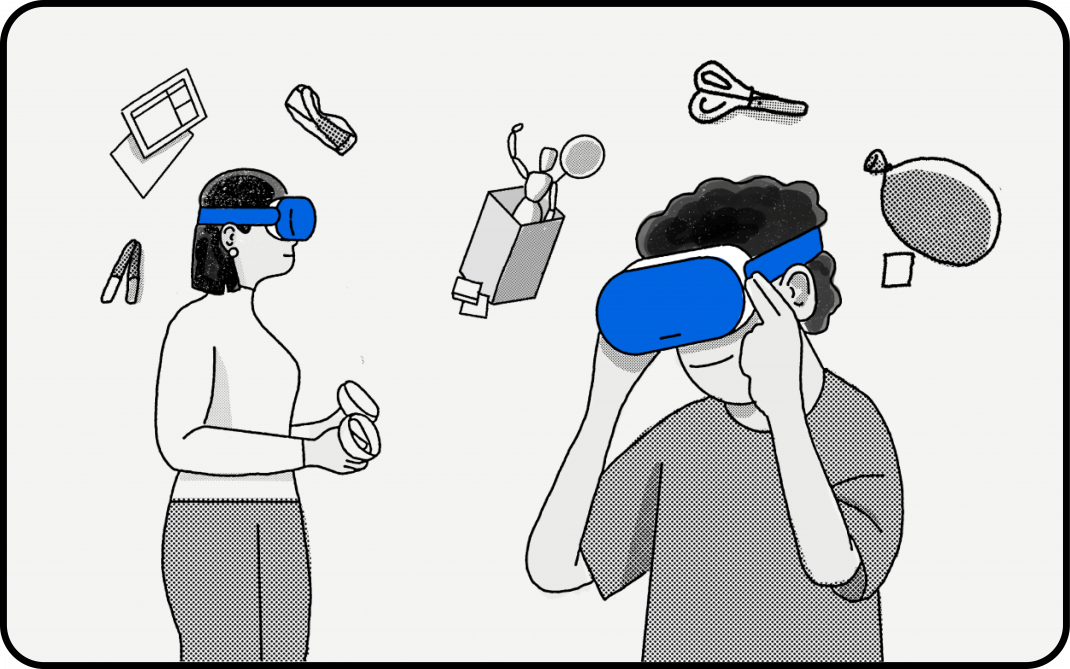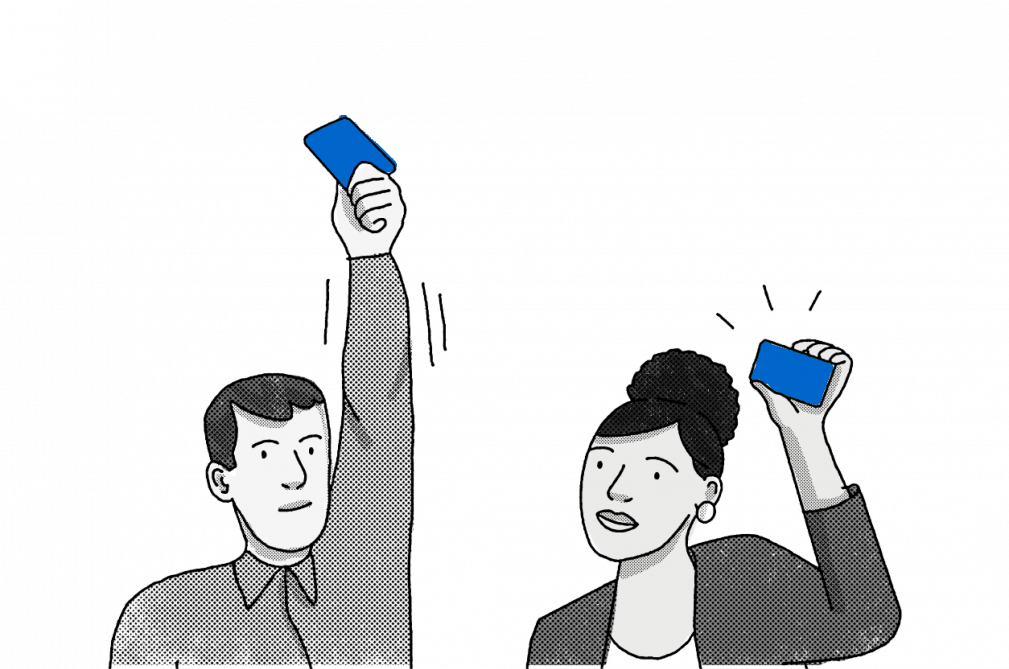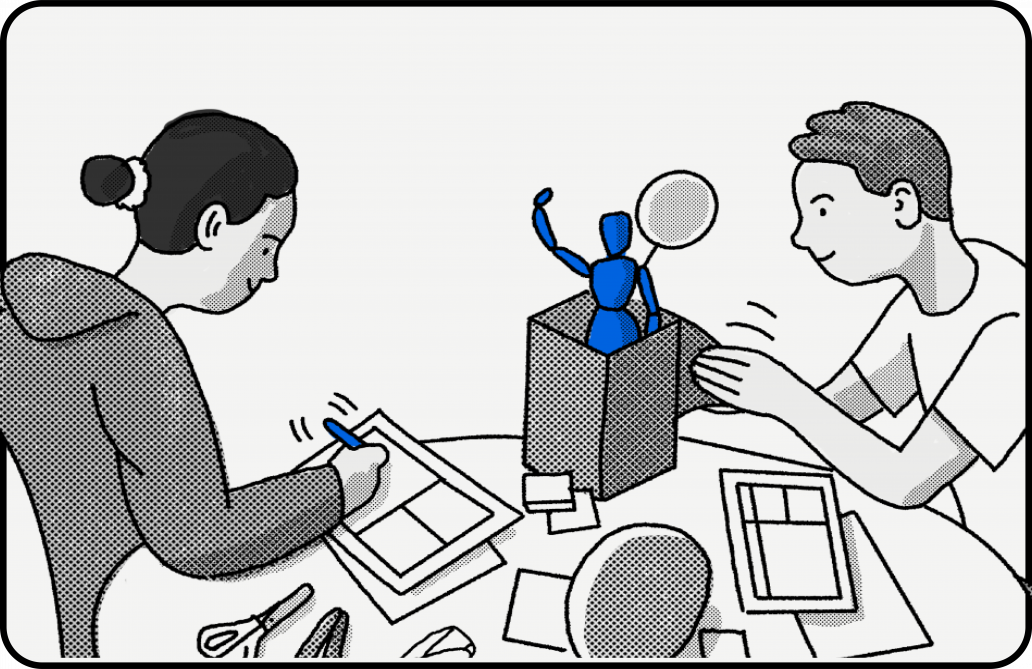Introduction
We prioritized the needs of families when designing age-appropriate experiences for children aged 10-12 in Meta Horizon Worlds. In Meta Horizon Worlds — which is available on the Meta Horizon mobile app, on the web via horizon.meta.com, and on Meta Quest, our mixed and virtual reality device — people can connect with friends, explore quests, play games, visit community and social spots, attend events and concerts, and create their own places and spaces to express their creativity.
As part of the principles for responsible innovation at Meta, our goal for Meta Horizon Worlds is to provide age-appropriate, safe, and positive experiences for children aged 10-12 and teens, with a focus on real-time social connection, immersive content, and self-expression. To inform our approach, we brought together children aged 10-12, early teens aged 13, and parents and guardians, alongside third-party organizations and advisors from civil society, academia, government and industry, to uncover product-relevant insights and principles. This initiative builds upon a multi-year effort by the Trust, Transparency & Control Labs, a Meta initiative to engage multiple stakeholders around the design of age-appropriate digital experiences.
![]()
What we did
Between August 2023 and May 2024, we conducted co-design research workshops with families in the US, UK, Ireland, and Australia (36 youth and aged 10-13 and 36 parents). These workshops were paired with consultations with 28 third-party organizations and advisors from civil society, academia, government, and industry, who were invited to observe the research workshops, provide feedback and explore aggregate insights together. The workshops were designed to help us explore key questions related to age-appropriate privacy and safety in multiplayer mixed and virtual reality experiences, including how to:
- Design for the diverse needs of youth, within and across age groups.
- Understand the controls, education, and insights that parents want to help manage their children’s experiences.
- Identify safety-by-design and privacy-by-default principles for children.
Co-design research workshops offered a creative and inclusive way of designing digital experiences by listening to and elevating multi-stakeholder perspectives. In this article, we describe some of our key learnings and explain how they’ve informed our approach.

Building for parental management and children’s unique needs
In our research workshops, parent participants told us that they saw the years of 10-12 as important years in which to instill a foundation of good habits. They ultimately wanted their children to build positive skills and dispositions that would enable them to navigate online spaces safely and responsibly on their own. Yet they also recognized that, compared with older ages, children at this age need more active parental intervention, often in the form of stricter rule-setting and monitoring, alongside conversations around online safety and privacy.
In the context of online multiplayer games, we heard that parent participants use strategies like tracking screen time or doing spot checks of their children’s direct messages and contact lists, and were seeking ways of monitoring their exposure to potentially problematic interactions, language, and content. Importantly, we heard from child participants aged 10-12 that they were also amenable to this level of parental involvement, and were comfortable operating within established boundaries and following rules. These child participants were also likely to seek affirmation and approval from their parents for a job well done, creating incentives for them to go to their parents for support.
What Meta is doing with these insights
With these insights in mind, here are some examples of what Meta is doing to support the safety and privacy of children aged 10-12 on Meta Quest and Meta Horizon Worlds:
- Parent-managed accounts: Parents must approve their children’s use of the Meta Horizon Experience on a Meta Quest headset or other devices, and manage their experience. Soon, parents will be able to approve Meta Horizon Worlds access for their children.
- Private profiles: Children’s Meta Horizon profiles will be automatically set to private, and people won't be able to follow them without approval. Parents have the option to choose to manage their children’s follow requests in Family Center on the web or the Meta Horizon mobile app and can determine their level of involvement, including whether they allow their children to manage follower requests on their own. Children will also be able to send follow requests.
- Approved contacts: Parents need to approve people for their children to chat and call using platform tools. Children can ask their parents to add someone as an approved contact. In Meta Horizon Worlds, only approved contacts can hear or talk to children, while all other people will be inaudible for children, and the children will be inaudible for them.
- Limited visibility: Children’s status and visibility settings will be set to show as offline to others, and only parents can change this default setting.

Enabling parental controls and family education for age-appropriate digital experiences
We heard from parent participants that they struggle to keep up with the rapid pace of technological change and the numerous devices, apps, and games their children aged 10-12 and teens use. This is particularly true for mixed and virtual reality, as parents are often unfamiliar with these new technologies and cannot easily monitor their children’s online activities due to the nature of the headset experience. As a result, it can be difficult for parents to identify and address safety and privacy risks, and to support their children in navigating them.
In our research workshops, we heard parent participants say they desired a better understanding of virtual and mixed reality in order to be able to effectively supervise their children. Generally, parents noted that it was challenging for them to make informed decisions about what type of multiplayer experiences and content were appropriate for their child’s needs, including worlds, which are experiences that people can choose to enter or create.
Parent participants wanted default settings and clear recommendations that help them ensure that their child has an age-appropriate experience and reduces the amount of time they need to spend researching and approving experiences. For example, nearly all parent participants in Ireland and UK preferred the option to batch-approve a category of worlds for their child to use, based on recommended age range, content themes, and types of experience, rather than individually approve each world. However, parent participants also want the ability to monitor game activity and fine-tune approvals, whether it’s to make an exception for a blocked world or retroactively remove an approved game if it's unsuitable for their child.
What Meta is doing with these insights
With these insights in mind, here are some examples of what Meta is doing to support parents and help ensure the safety and privacy of children aged 10-12 in Meta Horizon Worlds:
- Age-appropriate content ratings: Worlds in Horizon will be rated according to our new Meta content ratings policy with three age categories: ages 10+, ages 13+, and ages 18+ (age may vary by region)
- Starter worlds: Children will initially be offered starter worlds: a select group of worlds for ages 10+ which are the default worlds the child has access to as an easy way to get started in Meta Horizon Worlds with high quality and appropriate experiences for young audiences.
- Parental controls: Parents will be able to see and control the worlds their child can access on Meta Horizon. They’ll have the option to approve or restrict individual worlds, or approve an entire age rated category of worlds for their children.
- Collaboration approval: Children will be able to collaborate on building a world through voice chat only with approved contacts. Parents will be able to see all world collaborators and remove their child from collaborating on a world if they choose to.
What do third-party organizations and advisors think of this process?
"As technology continues to develop in new and exciting ways it is incredibly important to have youth and their parents front of mind. That's why at Parent Zone we were so pleased to see Meta actively listening to families. Designing with families in mind will make experiences more family friendly and that is ultimately good for platforms as well as families."
- Vicki Shotbolt, CEO, Parent Zone, UK
“Digital trust is key for technology use and adoption. This project shows that by providing parents and children with these tools for safe social VR experience to connect with others and engage in meaningful interactions, Meta is committed to building digital trust with and among its users, in VR technology itself, and between parents and their children too.”
- Professor Tammy Lin, National ChengChi University, Taiwan
Read our report
We are publishing learnings and outputs from this research project, including actions from Meta, to share openly with the broader community of expertise around age-appropriate digital design. Read our detailed report for more information.




